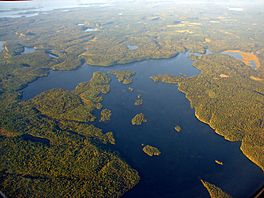Loch Lomond (Thunder Bay District) facts for kids
Quick facts for kids Loch Lomond |
|
|---|---|
 |
|
| Location | Thunder Bay District, Ontario |
| Coordinates | 48°15′25″N 89°19′28″W / 48.25694°N 89.32444°W |
| Type | Deep oligotrophic lake |
| Part of | Great Lakes Basin |
| Primary inflows | Underground spring |
| Primary outflows | Lomond River |
| Basin countries | Canada |
| Max. length | 9 kilometres (5.6 mi) |
| Max. width | 1.6 kilometres (0.99 mi) |
| Average depth | 27 metres (89 ft) |
| Max. depth | >73 metres (240 ft) |
| Surface elevation | 286 metres (938 ft) |
| Frozen | December to April |
| Islands | 13 |
| Settlements | Thunder Bay |
Loch Lomond is a large lake in Ontario, Canada. It gets its water from underground springs. This lake is about 102 meters (335 feet) higher than Lake Superior. It is located about 6 kilometers (4 miles) south of the city of Thunder Bay. You can find it behind Mount McKay, within the Fort William First Nation and Neebing Municipality.
Loch Lomond is known as a deep oligotrophic lake. This means its water is very clear. It also has low levels of nutrients. The lake is about 9 kilometers (5.6 miles) long. It averages about 1.6 kilometers (1 mile) in width. Because it's so deep, the lake's water layers separate in summer. This makes the deeper parts of the lake very cold. About 57,100 cubic meters (12.6 million imperial gallons) of fresh spring water flow into the lake every day.
Contents
Lake's Name and History
How Loch Lomond Got Its Name
This lake used to have an Ojibwe name. It was called Gaa-zaasaagijiwegamaag. This means "the high lake that is always overflowing." But a Scotsman from the North West Company saw it. He thought it looked a lot like the original Loch Lomond in Scotland. So, he named it Loch Lomond.
Loch Lomond as a Water Source
In 1906, the city of Fort William started a big project. They began digging tunnels through the rock of Mount McKay. They also laid water pipes. By 1909, fresh water from Loch Lomond began flowing. It reached the homes of people in Fort William.
This project was very important. In 1906, Fort William's water supply became unsafe. This led to many people getting sick with typhoid. The city council decided to act. They built a tunnel under the Kaministiquia River. This tunnel brought clean water from Loch Lomond to Fort William. The tunnels through Mount McKay were finished in 1910. The whole project cost about $500,000.
In 2006, the Bare Point Water Treatment Plant was made bigger. It now serves the entire city of Thunder Bay. This plant gets its water from Thunder Bay.
Protecting the Lake
To keep Loch Lomond's water clean, rules are in place. All activities on the lake are not allowed. This includes traveling on the lake and fishing. These rules help prevent pollution.
 | Selma Burke |
 | Pauline Powell Burns |
 | Frederick J. Brown |
 | Robert Blackburn |


